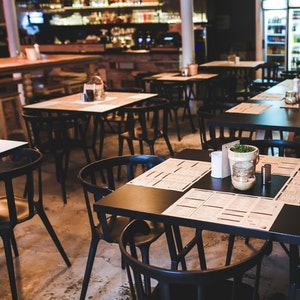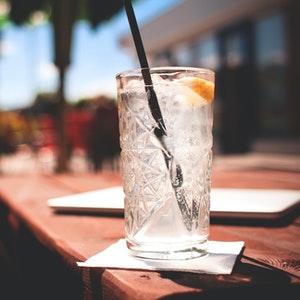Restaurants and Bars
Having a successful waste reduction and recycling program at an eatery, restaurant or bar has many benefits.

Having a successful waste reduction and recycling program at an eatery, restaurant or bar has many benefits. Business owners may save money and reduce their operating costs. And, as your customers and the general public become more focused on sustainability and patronizing eco-friendly places, there are additional conservation and environmental benefits to be enjoyed.
A recycling program at your restaurant or bar can be a success. If you need assistance in setting up a restaurant or bar recycling program, contact us.
Restaurants
Try these steps to reduce waste and start a recycling program in a restaurant or bar.
Perform a Waste Audit
You can't manage what you don't measure. Results from a waste audit provide a map on how to reduce waste including what you can and should be recycling or composting. We have step-by-step instructions for performing a waste audit. Also, our business recycling specialist is available for consultation and technical assistance with the auditing process.
Recycle Cardboard, Glass Bottles & Jars
Cardboard is often the largest part of a restaurant's waste stream by weight and volume. It is easily recyclable and a good first step for beginning a recycling program.
Glass bottles and jars can be recycled through Repeat Glass. Located in Cleveland, Repeat Glass offers recycling collection services for restaurants and bars in Cuyahoga County. You may be able to recycle glass bottles and jars through your waste hauler in a mixed recycling bin. Check with your contracted waste removal company to determine if this service is available.
If your building's physical footprint is large enough for a front load dumpster for trash, you may be able to add a recycling dumpster. And, by adding recycling, you could reduce the size of your trash dumpster and have less frequent pick-ups which helps save money. This cost savings will help pay for recycling. If your waste hauler is not able to provide recycling service, our business recycling specialist can provide assistance.
Reduce Waste
- Can packaging from your suppliers be reduced? Work with them to learn how.
- Some cardboard is not recyclable due to a special coating on the box. Reduce the amount of cardboard boxes by using returnable or reusable packaging for fruits and vegetables.
- Try to serve beverages on tap to reduce the use of bottles and cans.
- Recycle glass bottles, cans, and plastic bottles whenever possible.
- Look for ways to prevent waste. Can the menu be changed in any way to discourage the production of leftovers? Use LeanPath or other comparable software to track back of house waste and associated costs.
- Review stock management and inventory procedures to reduce the amount of expired or spoiled product.
Donate Excess Food and Compost Food Waste
Proper inventory planning will reduce the possibility of excess food. However, even with the best intentions, sometimes there is remaining stock. Food that has not left the kitchen and has been stored at the proper temperature may be donated. Rather than throwing it away, give excess food to employees or donate it to a local organization. Providing food scraps to local farms is also worth investigating. See a list of donation options in our Pass It On book and the food donation page of our business services.
Food waste at the back of the house from food preparation may be composted. Local companies will pick up these food scraps for composting. See a list here. Non-food scraps that can also be composted commercially include:
- coffee grounds and filters;
- tea bags (if not made of plastic);
- compostable service ware, cups, and plates;
- cardboard sleeves from hot beverages;
- boxes from fruit;
- clean napkins and paper towels;
- wooden stirrers and toothpicks;
- pizza boxes.
Larger kitchens that produce 1.5 or more tons of food waste a week may want to consider a Grind2Energy system.
Place Proper Bins and Signage
People only take 2-3 seconds to decide which bin they should place an item. Collection bins must be conveniently located, with three options available. The bins should be next to each other or in a system: landfill, compost, and recycling. They must be properly color-coded with easy-to-interpret signage and may vary depending on whether they're in the kitchen or dining area. See our guide for equipment and labels.
Educate, Educate, Educate (Education is Key)
To make the program work, regular employee education about the proper procedures and requirements for waste reduction, recycling and composting at your restaurant are necessary. Have pop quizzes at staff meetings. Include details in employee newsletters. Host a speaker. Make it a part of your staff interviews, on-boarding, and review processes.
Choose a Champion
Enthusiasm is contagious, especially if it comes from a key employee or team member. It's difficult for a waste reduction, recycling and composting program to be successful without direction from management or ownership. It is also important to have an employee or team of employees willing to promote and take ownership of the program.
Including all employees in the program is paramount to making everyone feel responsible for the program's success. See how to encourage and boost your employee participation by checking out workplace recycling behaviors and recycling at work.
Bars and Pubs

There are similarities for bars and restaurants regarding waste reduction and recycling especially since bars may serve food as well as beverages. Consider these tips:
- Cardboard is easily recyclable. Boxes should be clean, dry and flattened before recycling.
- Repeat Glass, a glass recycling service located in Cleveland, offers a collection program for glass bottles and jars. Or, consider making empty wine and beer bottles part of a mixed-stream recycling program at your bar. Several waste and recycling haulers in the area offer this service.
- Conduct a waste audit to learn how much cardboard, glass, cans, plastic bottles, cartons, and food waste is produced at your establishment. An audit would help determine what type of waste reduction and recycling program can be put in place, and if a composting program would be possible.
- Search the web for people who make crafts out of beer and wine bottles, corks and metal bottle caps. You may be able to supply them with the raw materials they need. Locally, the Upcycle Parts Shop accepts bottle caps and wine corks.
Resources
- Restaurant Food Waste Action Guide - solutions to food waste by ReFED
- Food Waste Reduction Tips
- 7 Step Restaurant Recycling Program
- National Restaurant Association Starting a Recycling Program
- Green Dining -- tips from the Green Restaurant Association
- Restaurant Recycling
- Food Waste Reduction in Restaurants
- Successful Cardboard Recycling in Food Service
- Improving Restaurant Sustainability
- Back of the House Composting
- Leanpath - food waste reduction software
- Winnow Solutions - food waste reduction software
- Tenzo - food waste reduction software
